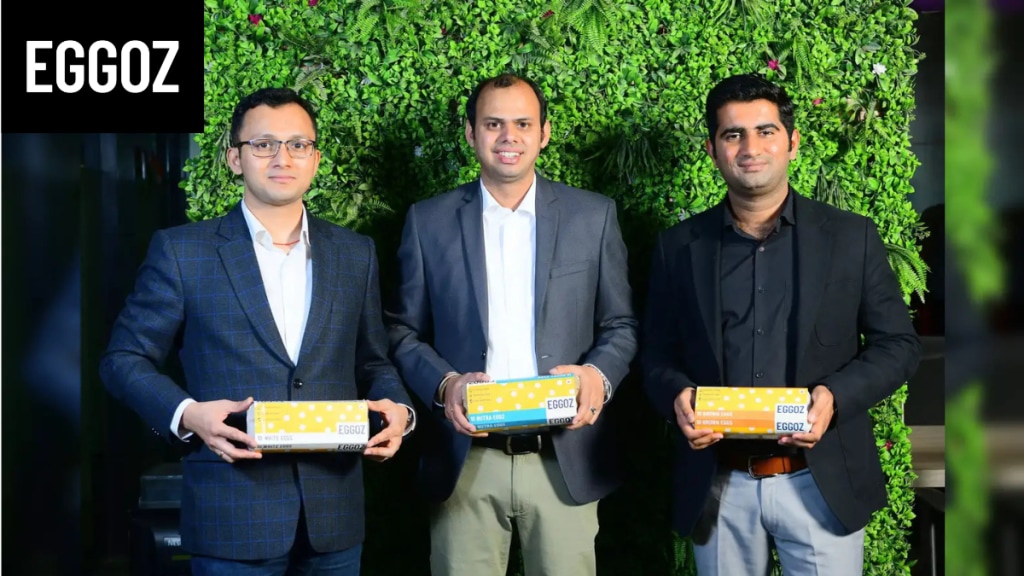In a country that consumes close to 40 crore eggs a day, one would assume quality is a given. But for the better part of the last decade, most Indian consumers have had to make peace with eggs that arrive unbranded, unclean, and often past their prime. Cut to 2017, three IIT Kharagpur grads stood in their Gurgaon apartment, staring at a sad batch of eggs—dirty, cracked, smelly, and oddly watery. For most people, it would’ve meant a change in grocery stores. For Abhishek Negi, Aditya, and Uttam, it sparked a business idea. Eggoz, the egg brand they founded, has been operating in 11 major Indian cities and aiming to crack Rs 1,000 crore in revenue in the next five years.
Eggoz reduced its losses to Rs 25.06 crores in FY24, compared to Rs 32.87 crores in FY23, as per data from the market intelligence platform, Tofler. The company’s revenue from operations grew to Rs 74.95 crores, up from Rs 55.49 crores the previous year.
At the heart of Eggoz’s pitch is a deceptively simple promise: fresher, cleaner, safer eggs. That’s a big deal in a country where more than 95% of eggs are still sold loose. “There’s no branding, no hygiene, no traceability. And consumers have accepted that as normal,” Negi told financialexpress.com.
The company began not with a tech solution but with a farm. The founders, with no background in poultry, set up a 12,000-bird unit in Bihar. “We needed to understand the supply chain from the ground up,” Negi recalled. That phase offered first-hand insight into both poultry farming and the logistical challenges of working in rural India. Eggoz has since moved to an asset-light model. It no longer owns farms but works with independent farmers who operate under its protocols. These include mandatory use of the company’s proprietary herbal feed, intended to eliminate antibiotics and synthetics from production.
To manage consistency, Eggoz supplies its partner farms with IoT devices and access to a farm management app. Data from these farms feeds into its centralised backend, which also handles post-harvest processing, grading, cleaning, and packaging eggs for dispatch.
The company’s growth strategy has been conservative by startup standards. Rather than pursue aggressive national expansion, Eggoz has focused on profitability at the city level. It is currently present in 11 major Indian cities, including Delhi-NCR, Bengaluru, Mumbai, and Hyderabad, and has begun testing distribution in smaller Tier 2 towns through partnerships.
Negi says the company turned profitable on a monthly basis last quarter. Since its inception, Eggoz has raised over Rs 127 crore in funding from investors including NABVENTURES, IvyCap Ventures, and Avana Capital. An IPO is being considered but is not imminent.
Not just for gym bros
India is the second-largest egg-consuming country in the world, with an estimated market worth of Rs 95,000–1,00,000 crore annually. Yet the formal sector has made limited inroads. The challenge, according to Negi, is less about direct competition and more about changing entrenched consumer behaviour.
Eggoz’s typical customer isn’t just the protein-obsessed millennial. It’s also the mother choosing better nutrition for her family, the elderly couple switching to cleaner options, and the everyday consumer learning, perhaps for the first time, that all eggs are not made equal.
But getting Indian consumers to pay a premium for something as basic as an egg? That’s a marketing challenge. Eggoz relies heavily on offline sampling and storytelling, showing consumers side-by-side comparisons, explaining what goes into the egg, and letting the difference speak for itself. “People want to know what they’re eating. Once they understand the difference, they stick,” Negi added.
India consumes nearly 40 crore eggs a day. That’s nearly Rs 1 lakh crore worth of eggs annually, and Eggoz wants a big bite. Yet less than 5% of the market is branded. That’s both the opportunity and the hurdle. Oh, and did we mention egg momos? Eggoz is also testing egg-based snacks, patties, nuggets, and more, for consumers looking for healthier, high-protein munchies. “We’re just scratching the surface,” Negi added. These products remain in limited circulation, mostly in Delhi-NCR.
As for expansion, East India and Gujarat are on the radar, but Negi reiterates that growth will remain calibrated. Eggoz’s current position is unusual in India’s consumer agritech space, profitable, relatively low-profile, and operating in a category most consumers barely think twice about. Whether that translates into a scalable business across geographies remains to be seen.

